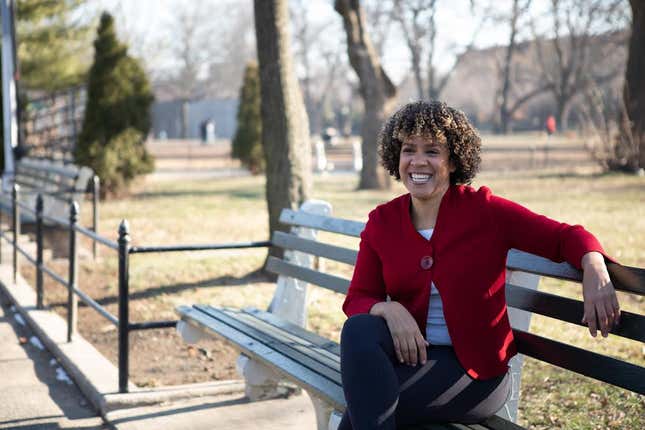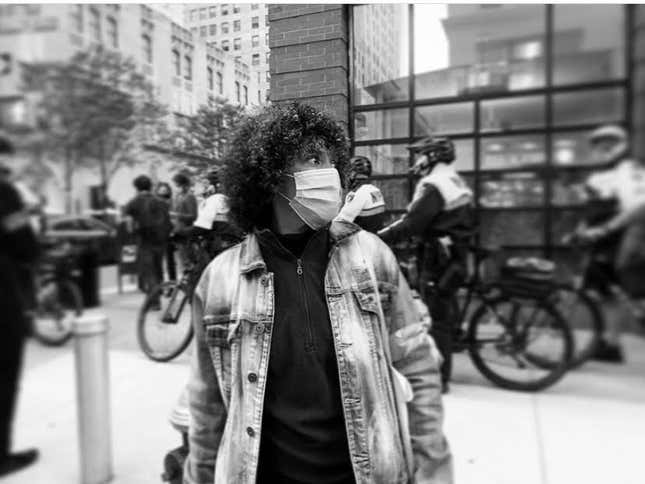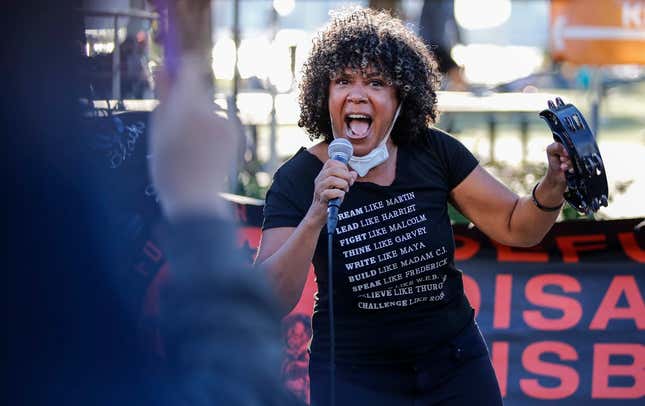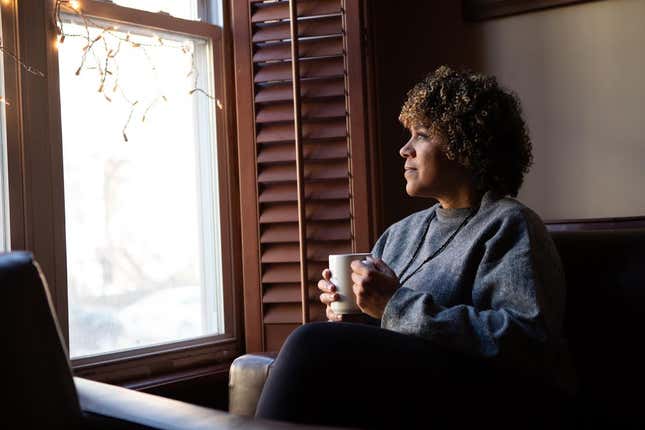
There are a lot of folks running for office who want to get back to normal. It makes sense, given how rough four years of Donald Trump have been. Here in New York City, where the pandemic has pulled the city into a projected $4 billion budget deficit this year and an unclear window of when vaccinations will be fully administered, the word “normal” sounds reassuring.
Not to Dianne Morales, who wants to be New York City’s next mayor.
She has no interest in returning to pre-COVID conditions of homelessness and lack of access to affordable housing, healthcare and mental health systems, she told The Root. For more than three decades, Morales, 53, has worked in the nonprofit world, primarily in the housing and education sectors. In January of last year, she stepped down from her CEO role at Phipps Neighborhoods, a social services nonprofit in the South Bronx, to run for mayor full-time and organize with Bedstuy Strong Mutual Aid.
She said much of the political discourse has focused, wrongly, on how to best return the city back to pre-COVID conditions—as if life in the city was somehow ideal for most New Yorkers.
“I just hear, ‘Let’s go back to the place where we sweep things under the rug and placate people around the edges just enough to keep them quiet.’ My feeling about this is the moment in time for us to throw out the old playbook and the old rules,” she said. “We really need that courage to say we’re not going back. I don’t want to go back. It wasn’t working for me and I know, it wasn’t working for the communities that I was trying to serve.”
Dozens of people have filed paperwork to run for mayor, but only a handful of them are serious contenders for Gracie Mansion. Morales is one of several Black candidates running, along with Maya Wiley, Brooklyn Borough President Eric Adams and businessman Ray McGuire. Two of Morales’ most notable campaign hires include Ify Ike, a well-established progressive political consultant who ran for New York City public advocate in 2018. Whitney Hu, who ended her 2021 city council campaign, is Morales’ campaign manager.
The diversity of her two most senior picks reflect the type of multicultural engagement she plans on using as the campaign heats up. Early polling—and it is very early polling—has former presidential candidate Andrew Yang, who has not declared but has filed paperwork to run, ahead of the pack with 17 percent and Adams a point behind at 16. Morales is in the single digits with the rest of the candidates, including Wiley, New York City Comptroller Scott Stringer and McGuire.
Again, it is early and New Yorkers will likely start focusing on the municipal races after the Jan. 20 inauguration of President-elect Joe Biden. Morales’ strategy to move ahead of the pack is simple: by showing voters that neoliberalism is killing them and that she is the only one brave enough to create a new form of governing—starting with the ways in which the city houses people.
Homelessness in New York City has reached the highest rates since the Great Depression of the 1930s, according to the Coalition for the Homeless. While the pandemic has worsened homelessness, Morales believes the primary problem is the expense of living in New York City. Developers drive housing policy in the city and benefit from all the tax incentives and tax breaks, she says. That model should be flipped in favor of poor communities making real decisions in crafting housing priorities, as she sees it. Any dollars made from new housing should be invested in those communities first rather than prioritizing the developers.

A native of Bedford-Stuyvesant, in Brooklyn, Morales grew up looking through windows of people’s brownstones, dreaming about purchasing one of her own—which she was able to do before real estate prices skyrocketed. Median rent fell to all-time lows last year, but was still out of reach for most New Yorkers, with rent in Brooklyn and Queens averaging $2,400 and $2,100, respectively; in Manhattan, it’s $2,776. New York state lawmakers approved legislation halting evictions for another two months, but few know how to proceed once the ban expires. Morales believes the city should repurpose currently vacant commercial spaces for the homeless. The same for vacant hotel rooms for hotel businesses that are not coming back anytime soon. Another policy move she would make is to increase the taxes of the pied-à-terre or vacant luxury units she says developers get to sit on for tax write-offs.
“The notion of property ownership is one that was man made,” Morales said. “It’s an economic paradigm that we can change. We can focus on social housing. There are countries that done it successfully and have very low homelessness rates. That would be a huge priority because if you don’t have a roof over your head, that has implications to public safety and public health. All of those things are inextricably linked.”
She also believes there should be caps on how much money a landlord can charge for non-luxury rentals. “We need to move away from that to accessible and affordable,” she said.“It’s not just about, ‘Oh, you can afford the $100,000.’ That’s not the average New Yorker. If we’re orienting our policies towards the average New Yorker, then we have to control how much somebody can be charged for rent.”
Morales thinks the current housing system disadvantages vulnerable residents who can’t defend themselves against landlords, which is why she supports tenants having first right of refusal. For example, if a property is going into default or is rundown because a lot of tenants live in properties that are in decrepit conditions, Morales believes tenants should be able to take over ownership of those buildings. That way, tenants aren’t dealing with neglectful landlords and have a pathway to ownership of their own residences.
Once people have roofs over their heads, other issues like public safety can be addressed. Better policing or putting more money into their coffers isn’t going to stop the surge in crime, she said. Morales notes crime has increased despite the NYPD not seeing any real cuts to their budget. (Activists say city officials simply shifting money from one department to the next and freezing hiring, for example, is not real divestment; Morales calls the manner in which the “alleged cuts” were made dubious, at best, and was akin to a shell company-scheme to fool New Yorkers into believing the city made significant reductions.) She points out that the surges in crime come at the same time there’s been an increase in housing and food insecurity, COVID-19 deaths and illnesses related to the virus.
Violent crime is a manifestation of people not having the means to survive, Morales said. No policing plan will undo the wave of crime the city is experiencing. The next mayor needs to reimagine what it means to be a healthy New Yorker and that starts with divesting from institutions like the New York Police Department and investing in social services. For too long policing and safety have become confounded, she told me.
“If you ask a room of people to close their eyes and envision a safe community,” Morales said, “what they envision doesn’t have any police involved.”
Instead, she would divest funding from the NYPD and invest it in other departments such as housing, mental health services, all of the areas cops aren’t trained in. She mentioned a New York Times report that found the vast majority of calls cops respond to aren’t violent crime, so there is room to divest from policing. This is how she talks to weary residents about what defunding the police means, a policy that she supports. None of her conversations start with “I support defunding the police” because Morales knows most people don’t know what that really means.
“A different way I talk about it sometimes is, ‘We’re going to unburden them’ because right now they’re burdened with having to respond to things that they’re not trained for and they didn’t sign up for,” she said. “We’re going to unburden them and we’re going to direct those resources towards the services that the communities really need. That’s what I think about when I think about defunding the police.”
This is one of the most diverse fields of mayoral candidates in recent memory, not only in ethnic diversity but ideas. The unanswered question is who of the candidates can convince cautious New Yorkers that their vision is one that will make them feel secure about the city’s future. More specifically for Morales is whether she will be able to penetrate the city’s massive media cycle often enough to be on voters’ radars.

“Diana Morales has great ideas, but I don’t think she has the organization or the fundraising capacity to really be taken seriously by the media,” Susan Kang, associate professor of political science at the John Jay College of Criminal Justice, said. “In non-COVID times, she would have volunteers and be present, in-person, to connect with voters. All of the candidates have that handicap right now. So it’s those who can raise the most money. To have the best phone book banking, glossy mailers and media operations is going to make a big difference.”
A representative from Morales’ campaign told The Root they aren’t releasing recent fundraising numbers yet, but the candidate did reach her 5000th donor last week and, according to their numbers, were the first to hit the 2000 New York City donors. The rep added that 33 percent of their donors reported being unemployed during the last filing.
“Resources are necessary to win races,” the rep said. “But at the end of the day, coins don’t vote, people do. We may not have the wealthiest donors, but we represent the heart and soul of the city.”
Morales was born to a blue-collar, working class family. Her father was a union member at the Service Employees International Union or 32BJ and her mother worked as an office secretary for a union. The youngest of three by a generation—her sisters are 10 and eight years older than she is—Morales grew up in mostly Black and brown communities as an Afro-Boricua. Her upbringing shaped her identity and her future political views. Her attendance at elite educational institutions in the city, like Stuyvesant High School, was especially illuminating.
“That was when I became aware that we were poor, when I became aware of what other people had access to,” she said. “I started to become aware of inequities because when I went to Stuy, there were a lot of white kids. Going to their houses, seeing how they lived was the first flag. Being aware that they came back from school breaks and we’re talking about ski trips to Vail or had gotten nose jobs. Seriously, high school.”
Christina Greer, associate professor of political science at Fordham University, said Morales is probably the most progressive candidate in the race, which may be a minus for her. New York City is considered a progressive bastion, but the town is also different shades of blue.

“We’ve got the Democratic Wall Street crowd that’s not interested in transformative change,” Greer said. “We’ve got the status quo crowd who, as long as crime and violence stay in certain sections of particular neighborhoods, they’re fine. We have lots of New Yorkers who believe in NIMBY [an acronym that stands for “Not In My Backyard” and is used by people who reject developments in their communities deemed inappropriate]. They care about these issues in theory, but transformative change means it’s going to be uncomfortable for comfortable New Yorkers. That is where Dianne Morales is, but that’s not where the vast majority of New Yorkers are or have been in the past. Keep in mind we had 20 years of Republican mayors.”
Morales admits that voters need to be educated on how her untraditional form of government will make their lives better. During an interview with Brian Lehrer of NPR affiliate WNYC, the host asked how she planned on paying for her community-centered policies of divesting from corporate interests and the NYPD to investing in the poorest of New Yorkers. Her response, in part, questioned why no one asks how financially beneficial policing or corporate bailouts are.
When The Root asked what makes her the safer choice over the other candidates, Morales gave an answer as untraditional as the style of government she plans to lead if she wins.
“I’m not the safer choice,” she said. “I am the bold, transformational choice. I am the choice of people who are willing to realize that who we are and where we are is not where we want to be. My candidacy represents having the courage and the conviction to become something that we’re not. I have to believe that, on the heels of what we’ve just experienced as a city, there are enough of us who are willing to have that conviction that we can make a choice to move in a different direction.”

